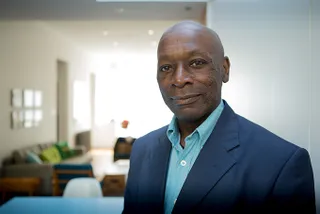
'I'll Never Have The Chance To Do This Again, So I'm Going To Give It My Best' | A Q&A with Keith Antoine
We spoke to Keith Antoine to hear about how he has dedicated his life’s career to helping people perform at their best – though in very different industries, his top tips on marginal gains and both who and what has been the greatest influence in his life.
Can you tell us about your career path to date?
Looking back my career seems to have taken an unpredictable path: from a computer operator to communications analyst and project manager, onto people development through to coaching in business and athletics. The one constant has been performance, and this is where I now focus - helping organisations to perform via interventions from keynotes to leadership skills development to specialising in having effective performance conversations and helping athletes to perform at the top level which includes delivering medals at major championships!
Can you tell us what an average day coaching might look like for you?
I have three types of coaching days:
Business skills development – these involve assessing participant capability, adjusting the session to suit, intense paying attention and provoking thought to help participants identify and practise ways of increasing their effectiveness.
Business keynotes – these involve scheduling an early arrival for the delegates to hear key messages and context, observing the audience, making any necessary adjustments, and delivering a fun, challenging, thought-provoking session.
Athletics coaching – these usually start with the school run, confirming the type of session based on atmospheric conditions and the athlete’s status, agreeing on session outcomes, asking the athlete to think through key aspects of the session, reviewing outcomes and learning to incorporate them into the next session, and all in time to do the reverse school run!
What are the most challenging and rewarding aspects of your role as a coach?
Definitely the most rewarding is seeing the pleasure and satisfaction on the face of whoever I have been working with when they deliver their planned performance. This is closely followed by observing those mental breakthrough moments when they realise a way forward with something that has been challenging or blocking them.
It can be very challenging to stay objective when plans do not work, and performances fall short of expectation. A momentary pout may be acceptable; however, it is more important to understand the reasons for the performance than it is to stamp feet or throw toys.
What can companies learn about marginal gains in sport and how can they apply the same practices to business?
The difference I notice is that in sport there is meticulous planning for the marginal gains rather than primarily planning for the bigger desired outcomes. Another difference is that in sport marginal gains are expected from everyone involved in the process, whereas in business they tend to be expected from the various collectives. The biggest difference, however, is that in sport marginal gains are based on true performance goals. Performance goals are distilled from the desired outcomes and are 100% in the control of the performer. It is rare to find people in business who are assessed against true performance goals.
"Accurate performance analysis and the setting of effective performance goals"
What or who has been the greatest influence in your life?
I'll go for a who and a what, and it's a bit of a family affair. The who is my mother who successfully raised 3 boys on her own providing a daily example of the power of having clear goals and working hard to achieve them. The what is a response from my younger brother when I was coaching him for athletics. He won't mind me saying that he wasn't the most talented athlete, but he had the ability to produce his best during every training session regardless of the circumstances. I asked him how he did this. His approach was, "I'm never going to get another chance to do this run in this session so I'm going to give it my best." Over 25 years later, I still try to take that approach into everything I do.
What are the similarities and differences between individual improvement and team improvement?
Both rely on clear objectives and outcomes, accurate performance analysis and the setting of effective performance goals. Individuals are accountable for their own performance, whereas within successful teams each person feels accountability to their teammates. For me, the key difference is that successful teams develop skilful interplay between team members which contributes to and enhances each team member's contribution to the overall team performance. Teams are comprised of individuals, therefore focus on the individuals and not just the team. Develop each individual, enhance the interplay between team members and watch the team's performance soar.
Thanks, Keith!
For further information call us on or email info@speakerscorner.co.uk .
Newsletter Sign Up
If you liked this article then why not sign up to our newsletters? We promise to send interesting and useful interviews, tips and blogs, plus free event invites too.
Have an enquiry?
Send us a message online and we'll respond within the hour during business hours. Alternatively, please call us our friendly team of experts on +44 (0) 20 7607 7070.
